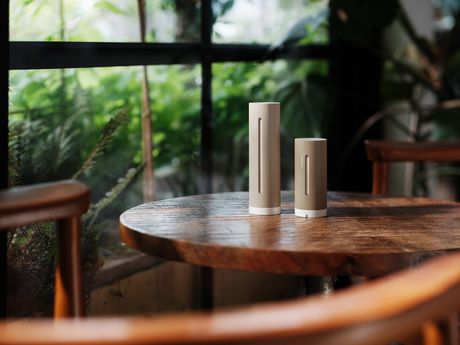
Netatmo präsentiert die Wetter Station ORIGINAL

Eine Elektroheizung kann direkt oder indirekt sein: Das sind zwei sehr unterschiedliche Heizsysteme. Wenn es direkt ist, verwendet das Gerät direkt Strom, um den Raum zu heizen, es ist somit eine elektrische Raumheizung. Wenn es indirekt ist, handelt es sich um einen Elektrokessel oder ein Wärmepumpe die Elektrizität zur Erzeugung von heißem Wasser verwendet, welches anschließend in einem Zentralheizungssystem zirkuliert.
In Deutschland benutzen nur wenige Haushalte Elektroheizung wohingegen in Frankreich 25% aller Wohnungen mit mindestens einem elektrischen Direktheizkörper ausgestattet sind. In den letzten Jahren lässt sich bezüglich der Elektroheizung ein wachsender Erfolg feststellen. Der Grund für den wachsenden Erfolg ist die schnelle Warme und die ideal verteilte Temperatur im Raum.
Es sind viele verschiedene Arten von elektrischen Direktheizkörpern erhältlich. Sie unterscheiden sich in ihrem Aufbau: Ein Elektroheizer kann horizontal, vertikal, niedrig oder als Fußleiste angebracht werden. Die wichtigsten Modelle der Elektroheizung sind dann der Elektrokonvektor, der Elektroheizstrahler oder Heizstrahler, der elektrische Handtuchtrockner, der elektrische Trägheitsheizkörper und die elektrische Fußbodenheizung. Je nach Leistung variiert auch ihr Preis stark: von 20 € für einen elektrischen Konvektor der Einstiegsklasse bis zu mehr als 1.000 € für einen elektrischen Trägheitsheizer.
Um Ihr elektrisches Heizsystem einfach zu programmieren, einzustellen und aus der Ferne zu steuern, installieren Sie einen intelligenten Thermostat von Netatmo! Dieser ist ideal, um die Heizleistung und den Wirkungsgrad zu erhöhen und gleichzeitig Ihren Verbrauch und Ihre Stromrechnung effektiv zu senken.
Die elektrische Heizung in Form eines Konvektors nutzt ihren elektrischen Widerstand, um Wärme zu erzeugen und die Temperatur des Raumes zu erhöhen. Warme Luft steigt auf, kalte Luft sinkt ab und wird erwärmt. Diese Bewegung verbreitet die Wärme durch Konvektion.
Dieser elektrische Zusatzheizer hebt die Raumtemperatur schnell an, hat aber eine sehr geringe Trägheit. Diese Art der Heizung sollte daher nur verwendet werden, wenn Sie sich im Raum aufhalten, um Energieverluste zu vermeiden.
3 Tipps für den Einsatz eines Elektrokonvektors als Zusatzheizung:
Bei dieser Art der elektrischen Heizung erzeugen Infrarot (IR)-Strahlen Wärme und simulieren das Gefühl von Sonnenschein im Raum. Die Wärmeausbreitung erfolgt somit hauptsächlich durch Strahlung, aber auch durch Konvektion: der gesamte Raum, die verschiedenen Möbel und die darin befindlichen Materialien werden gleichzeitig erwärmt. Der Komfort ist daher ausgezeichnet, da das Gefühl angenehm und die Wärme weich ist.
Elektrische Heizstrahler heizen zwar schnell auf, haben jedoch eine sehr geringe Trägheit:
Sobald sie ausgeschaltet sind, geben sie keine Wärme mehr an den Raum ab.
Der bekannteste der elektrischen Heizkörper befindet sich im Badezimmer: es ist der elektrische Handtuchhalter. Es handelt sich um einen Heizkörper, in dem ein oder mehrere Widerstände durch eine Flüssigkeit oder einen Festkörper geführt werden. Die Wärme wird dann im ganzen Raum verteilt. Dank dieses Prozesses ist die Wärme angenehm und komfortabel, da die Temperatur gleichmäßig ansteigt. Bei diesem Heizkörper werden Stangen zum Aufhängen von Handtüchern verwendet, um diese zu trocknen oder zu erwärmen. Daher kommt auch der Name elektrischer Handtuchtrockner.
Der neueste elektrische Heizkörper ist das effizienteste und interessanteste elektrische Heizsystem. Dieser Trägheitsheizer ist ein Zusatzheizer, der, wie der Name schon sagt, eine hohe Trägheit bietet, wodurch der Raum effizienter beheizt werden kann. Er gibt Wärme ab und erhöht die Temperatur auch dann, wenn er nicht eingeschaltet ist. Dies ist bei einem Elektroheizer sehr selten.
Um wirklich vorteilhaft zu sein, muss diese Elektroheizung jedoch mit einer hervorragenden Wand- und Dachbodendämmung kombiniert werden. Folglich sind seine Vorteile zahlreich:
Der elektrische Trägheitsheizer kann ganz einfach in jedem Raum ihres Hauses installiert werden und funktioniert mit Wärmeabstrahlung. Diese Wärme wird entweder über eine Flüssigkeit im Inneren der Heizkörper, oder über Gusseisen, Keramik, Stein, Aluminium oder andere Heizkörpermaterialien verteilt.
Es gibt daher viele Modelle von elektrischen Trägheitsheizkörpern, jedes mit unterschiedlichen Materialien, variabler Funktionalität und einer bestimmten Leistung: Dazu gehören beispielsweise der gusseiserne Blockheizkörper, der Wärmeträgerflüssigkeitsheizkörper, der Soft-Heat-Heizkörper, und viele mehr.
Eines der elektrischen Heizsysteme mit dem größten Komfort ist ohne Zweifel die elektrische Fußbodenheizung. Es ist jedoch zu beachten, dass bei dieser Art von Heizung die Wärmeausbreitung weniger schnell und unmittelbar erfolgt als bei den meisten elektrischen Heizkörpern. Es gibt in der Tat eine gewisse Zeitverzögerung zwischen dem Beginn der Heizung und dem Temperaturanstieg im Raum.
Andererseits ist die Trägheit der elektrischen Fußbodenheizung sehr wichtig, sogar noch mehr als bei einem elektrischen Trägheitsheizkörper, was nochmals den Komfort steigert.
Da Sie nun die verschiedenen Arten von elektrischen Heizkörpern kennen, ist es an der Zeit, eine Auswahl zu treffen, welcher Typ in ihre Räumlichkeiten passen könnte. Beachten Sie dazu Folgendes:
Elektroheizungen liegen im Trend, vor allem als Zusatzheizsystem. Achten Sie jedoch darauf, dass Sie die für Ihre Räumlichkeiten die am besten geeigneten Variante wählen. Vergessen Sie auch nicht, dass diese Heizung trotz einer geringen Anfangsinvestition mitunter viel Strom verbraucht, dessen Preis sehr hoch ist. Es handelt sich um die teuerste Energie! Die modernen Trägheitsstrahler profitieren jedoch von ihrem geringeren Kraftstoffverbrauch.